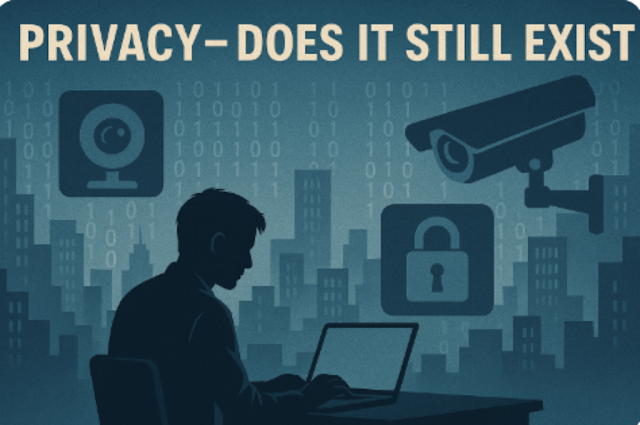Privacy – Does it Still Exist
This information is also available on my YouTube Channel at: https://youtu.be/veMyD-0pgzM
If you prefer, you can also listen to this information on my Podcast at: https://creators.spotify.com/pod/show/norbert-gostischa/episodes/Privacy--Does-it-Still-Exist-e30rsrb
In a world where smartphones, smart TVs, smart speakers—even smart refrigerators—are everywhere, it’s time we asked ourselves a tough question: Does privacy still exist?
The short answer? Not really. But that’s not the whole story.
Let’s rewind for a second. Not long ago, privacy meant closing your curtains, locking your diary, and keeping your personal life, well… personal. But fast-forward to today, and our lives are increasingly digital. We share what we ate, where we went, who we’re with, and what we’re thinking—all at the tap of a screen. While that might seem harmless, every post, like, and location check-in is another piece of a much bigger puzzle: your digital footprint.
The Trade-Off: Convenience vs. Privacy
We’ve all agreed—perhaps unknowingly—to a silent trade: we get free services like email, navigation, and social media, but in return, we hand over personal data. Big Tech companies collect this data to learn about us—what we like, what we buy, how we think—and they use it to target us with ads, personalize content, or even predict our next move.
It’s not just social media. Websites track your clicks, apps log your location, and devices listen in for voice commands. Ever talked about something and then seen an ad for it? That’s no coincidence.
Who’s Watching?
You’d be surprised at how many eyes are on your data. There’s the obvious: advertisers, data brokers, and social platforms. Then there’s the more shadowy side—hackers, cybercriminals, and even governments. In some cases, surveillance is meant to protect us from threats. But when data collection goes unchecked, it crosses into unsettling territory.
China’s massive surveillance network uses facial recognition to monitor its citizens in real-time. In the U.S. and Europe, surveillance is more subtle but still widespread, often in the name of “national security.”
Can You Be Private Online?
Here’s the silver lining: while total digital privacy might be a myth, you can take steps to control your data and protect your identity. Think of it like locking the doors on your house. You may not stop every break-in attempt, but you make it a lot harder for anyone to get in.
Here are a few privacy tips even beginners can follow:
Use Strong, Unique Passwords for every account.
Turn Off Location Sharing unless you really need it.
Limit App Permissions. Does that calculator really need access to your photos?
Use Encrypted Messaging Apps like Signal or WhatsApp.
Choose a Privacy-Focused Browser.
This last one’s important, so let’s dive in a bit deeper.
Brave and Firefox: Your Privacy Wingmen
If you're serious about privacy, ditch the default browser and pick one that protects you. Two great options are:
Brave Browser: It blocks trackers and intrusive ads by default, speeding up your browsing experience while protecting your data. It’s based on Chromium, so it feels like Chrome but without the spying. It even has a built-in Tor mode for extra anonymity and a privacy-respecting ad system that lets you earn crypto (BAT tokens) if you choose to view ads.
Firefox (by Mozilla): A veteran in the privacy game. It’s open-source, nonprofit, and loaded with privacy tools. You can customize what gets blocked, from cross-site trackers to cryptominers, and it supports powerful extensions for even more control.
Both are fantastic—Brave is great out of the box, while Firefox is ideal if you like to tweak and fine-tune your settings.
The Future of Privacy
So, where do we go from here? Some experts argue that privacy is already gone and we’re living in a “post-privacy” world. Others believe that awareness and legislation can bring it back under control.
There’s hope. Governments around the world are pushing for stronger data protection laws. Europe’s GDPR and California’s CCPA are major steps in that direction. Even tech companies are starting to promote “privacy” as a selling point.
But in the end, you are your best defense. Understanding how your data is collected—and taking control of it—is the first step to reclaiming a bit of your digital privacy.
So, does privacy still exist? Not in the way it once did. But with the right tools, habits, and mindset, you can still carve out a space that’s yours and yours alone in this hyper-connected world.
(AI was used to aid in the creation of this article.)
"I'll see you again soon. Bye-bye and thanks for reading watching and listening."

.png)
Comments